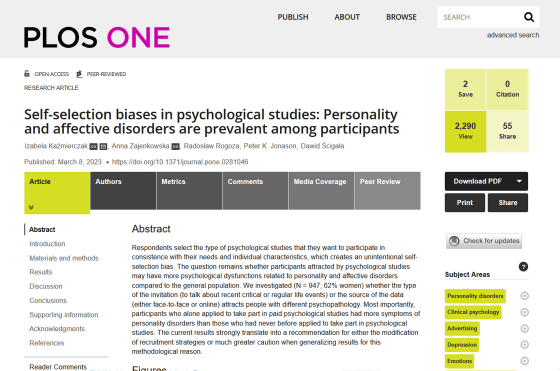Possibility of bias in experimental results due to ``tendency of people applying for psychological research''

Psychological research collects a large number of subjects and is careful not to bias the experimental results. However, since the subjects of psychological research are people who have applied with some motivation, such as participation rewards and lecture credits, there is a possibility that there is a ``tendency of subjects to apply for psychological research''. So the Polish research team investigated the tendency of subjects to apply for psychological research.
Self-selection biases in psychological studies: Personality and affective disorders are prevalent among participants | PLOS ONE

People with personality disorders are more likely to sign up for psychology studies – here's why that's a problem
https://theconversation.com/people-with-personality-disorders-are-more-likely-to-sign-up-for-psychology-studies-heres-why-thats-a-problem-201237
A research team at Maria Grzegorzewska University in Poland recruited a total of 947 subjects through online advertisement recruitment and inquiries from research officials to investigate the bias of people's tendencies to participate in psychological research on experimental results. rice field. All the subjects were Polish, and 62% of them were women.
The research team then divided the subjects into groups of ``people who have participated in psychological research'' and ``people who have never participated in psychological research'' and compared the trends in mental health and personality disorders. Did.
The analysis found that people who had previously participated in psychology studies were more likely to exhibit symptoms seen in others, such as personality disorders, depression, and anxiety disorders. People with personality disorders often have different thoughts, feelings, and relationships with others, and are more likely to behave unpredictably.

Regarding why people who participate in psychological research have a high percentage of personality disorders and mental health problems, the research team believes that participation in psychological research is a ``cheap alternative to getting professional help.'' It points out that it may be recognized.
The research team said, ``Researchers tend to assume that the way research is advertised and the subjects recruited do not have a significant impact on the results. It showed that people are drawn to research that allows them to express their own trauma, and that they may be more likely to apply for research.'

Psychological research is designed like many other scientific fields, except that it requires human subjects. Therefore, university students aged 18 to 24, who are easy to participate in research, are likely to be subjects, raising the question of whether the research results can be more widely generalized. The results of this study reinforce those concerns.
Researchers can't impose restrictions like 'people with personality disorders can't apply', but they can be more careful in how they select subjects. 'What we need to do is conduct studies with enough people, and repeat the studies, so that we can be confident that our findings will work outside of the university,' Holt said. It's about doing it,' he said.

Related Posts:
in Science, Posted by log1h_ik







